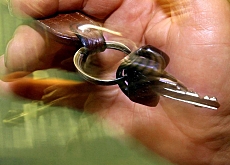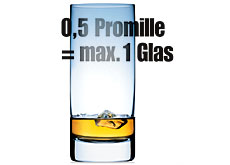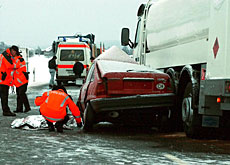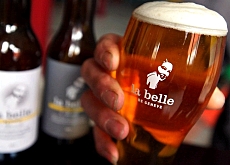Swiss drivers welcome new alcohol limit

The majority of Swiss know and accept the recently lowered drink-drive limit of 0.5 milligrams per millilitre, a survey has revealed.
What’s more, since the limit was reduced from 0.8 milligrams on January 1, the number of road deaths and injuries in which alcohol was a factor has decreased.
The study questioned 1,251 Swiss drivers and non-drivers last month. It was carried out on behalf of the Institute for the Prevention of Alcohol and Drug Addiction, which launched its “One glass is enough” campaign in November.
Ninety-one per cent could give the new limit, eight per cent couldn’t and only one per cent thought the limit was still 0.8 milligrams. In 2003 only 57 per cent of drivers knew the limit.
The new drink-driving limits are not just widely known but also accepted: 79 per cent approved of the new level, with women more likely to approve than men.
Roughly a quarter of drivers were in favour of zero tolerance: a total ban on drinking and driving. Fifty-six per cent thought 0.5 milligrams was right while 17 per cent thought the level should have stayed at 0.8.
Thirty per cent admitted to changing their drinking habits since the beginning of the year. Of these, 40 per cent drank less before driving, 22 per cent didn’t drink at all or didn’t drive, and 18 per cent stuck to the one-glass rule.
One in five admitted to occasionally drinking too much although they were driving.
Fewer accidents
Another recent survey by the SonntagsBlick newspaper found that since January 1 road deaths were down in 12 of the 18 cantons canvassed (from 88 to 78).
The number of accidents in which alcohol was a factor also decreased, from 480 to 379.
If the trend continues, the number of road deaths for the whole year could be under 500 for the first time (in 2004 it was 509).
But officials say the campaign is having little effect on heavy drinkers.
Dominique Rossi, from the Vaud cantonal police, said: “The number of accidents involving alcohol is indeed going down, but the number of drivers registering 0.8 milligrams and more is hardly changing.”
Lost orders
Opponents of the lower limit complain that the vast majority of alcohol-related fatalities are caused by “super drunk” drivers with blood alcohol levels much higher than 0.5 milligrams.
They say lower limits don’t prevent drink-driving fatalities and only punish responsible social drinkers.
Supporters of this view range from brewers and restaurant trade associations to individuals concerned with protecting civil liberties.
Klaus Künzli, president of the restaurant and hotel owners’ association Gastrosuisse, attacked the “one glass” campaign, saying it didn’t correspond to the facts and was seriously damaging businesses.
In the first quarter of 2005 landlords recorded a turnover loss of ten per cent compared with the same period the previous year.
The Swiss Brewery Association, which represents the big players such as Heineken and Feldschlösschen (Carlsberg), also blames the lowered limit for a sales slump of almost seven per cent during the first three months of the year.
For its part, the Swiss Council for Accident Prevention says anyone who has a blood alcohol level of 0.5 milligrams or over is unfit to drive – regardless of their alcohol tolerance.
swissinfo with agencies
One in five deaths on Swiss roads is caused by drunk drivers.
In 2004, 509 people died on Swiss roads.
About 30% of all traffic accidents – 50% at weekends – are caused by drink driving.
In 2004 the only European countries to have a total ban on drinking and driving were the Czech Republic, Hungary and Slovakia.
In Sweden, Poland and Estonia the limit is 0.2 milligrams per millilitre; in Ireland, Luxembourg, Malta and Britain it is 0.8. In all other European countries the limit is 0.5.
On January 1, 2005 the Swiss blood-alcohol limit for drivers was lowered from 0.8 to 0.5 milligrams per millilitre.
A campaign launched in mid-November urged drivers not to exceed one glass.
In a recent survey, 91% of Swiss people knew the new limit.

In compliance with the JTI standards
More: SWI swissinfo.ch certified by the Journalism Trust Initiative



You can find an overview of ongoing debates with our journalists here. Please join us!
If you want to start a conversation about a topic raised in this article or want to report factual errors, email us at english@swissinfo.ch.